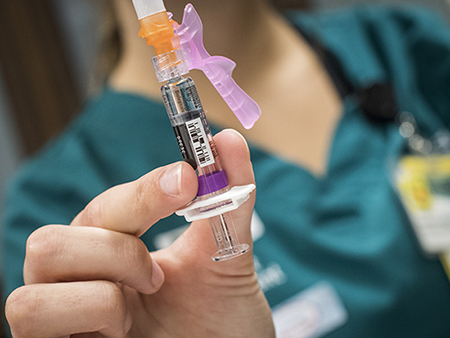
BIRMINGHAM, Ala. – “If there was ever a year to be sure you get a flu vaccine, this is it.”
That is the recommendation of Erin DeLaney, M.D., assistant professor in the Department of Family and Community Medicine in the School of Medicine at the University of Alabama at Birmingham.
“As we head into influenza season, with the novel coronavirus still circulating in our communities, it is more important than ever for people to get vaccinated against the flu this year,” DeLaney said. “COVID-19 has put significant stress on the nation’s health care system, and a bad flu season will severely stretch our health care resources.”
DeLaney says the flu vaccine will not provide any protection against infection from the novel coronavirus, but it can prevent or minimize the effects of the flu. And while this coronavirus is new and science is still unraveling its secrets, there is evidence that a person can be infected by more than one virus at the same time.
“We don’t yet know the precise risk of a dual infection with coronavirus and influenza, but it is certainly a possibility,” she said. “We can safely say that co-infection with both viruses could be serious, even life-threatening.”
DeLaney says the time to get a flu shot is in September or early October. Peak flu season is from December to February, and it takes a minimum of two weeks for antibodies against the flu to develop fully following vaccination. She also cautions against getting the shot too soon, such as in July or August, as the preventive effect will wear off over the subsequent months and flu can linger into spring.
The CDC advises getting a flu shot no later than the end of October,” she said. “Of course, even getting a vaccination later in the year is better than no vaccination at all.”
There is also no evidence that getting an early vaccination followed by a second booster shot in late winter is effective. A second shot does not increase the number of antibodies that the body produces. The exception is children 6 months to 8 years old who are getting their first influenza vaccination. That protocol calls for two shots, four weeks apart.
Persons over 65, who are at increased risk for influenza, should consider getting a higher-dose vaccination from their medical provider. DeLaney says it is a good idea to check with your medical provider or local pharmacy for availability of the higher-dose vaccine.
“The flu vaccine does not give you the flu. It is safe,” DeLaney said. “It can prevent the flu entirely, or limit the severity and duration of a case. I can’t stress enough how important it is that everyone get a flu vaccine this year. COVID-19 and the flu present with similar symptoms. A bad flu season, on top of the COVID-19 pandemic, could be devastating.”



















